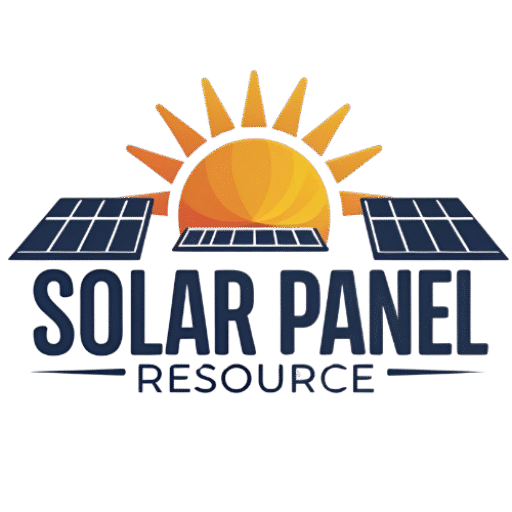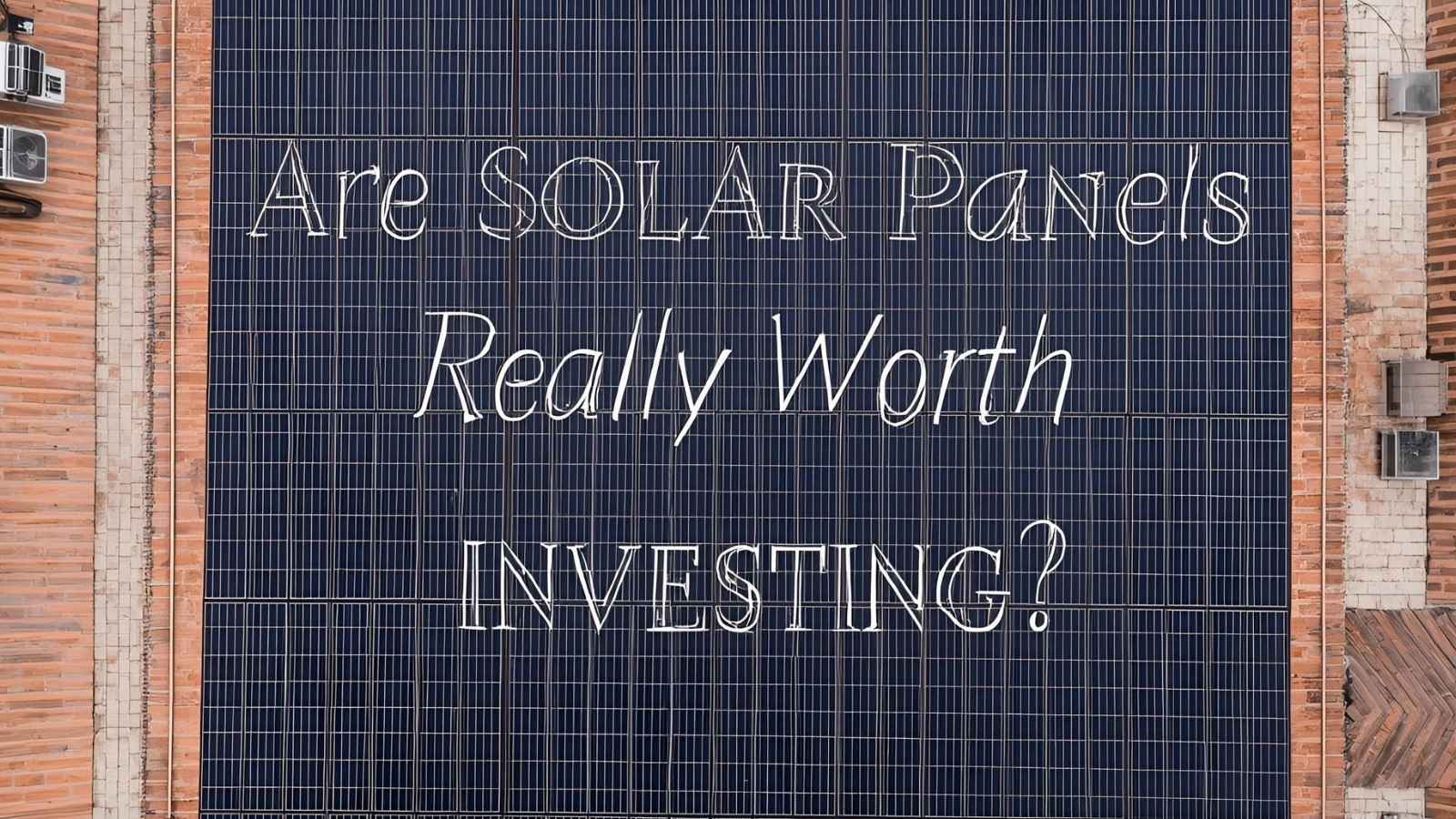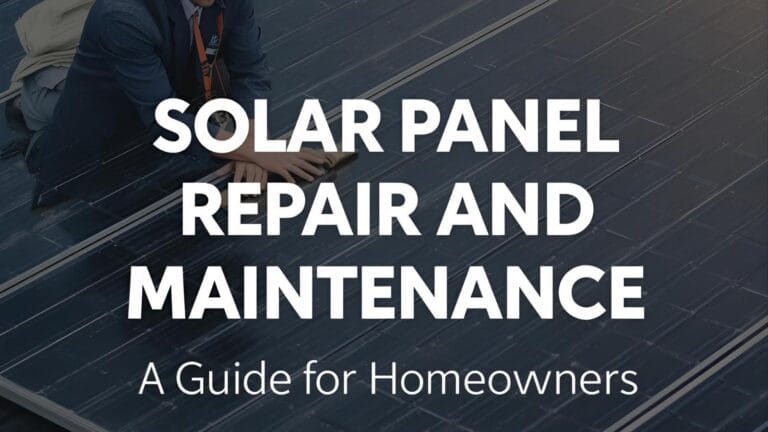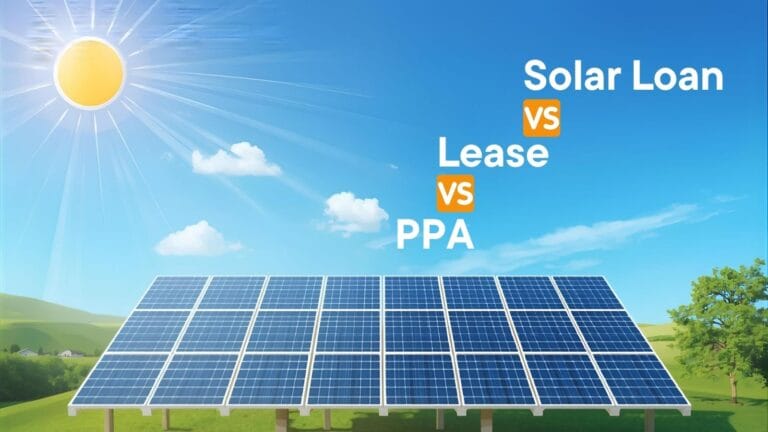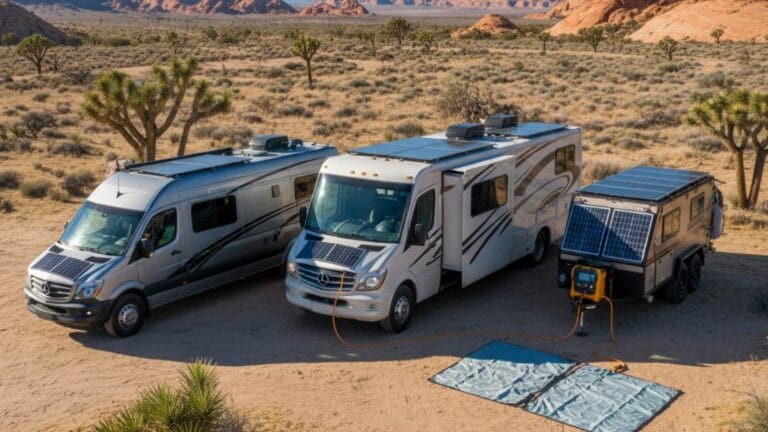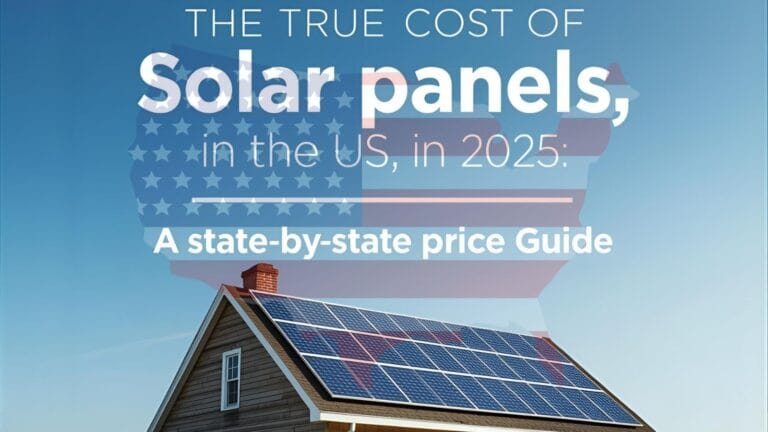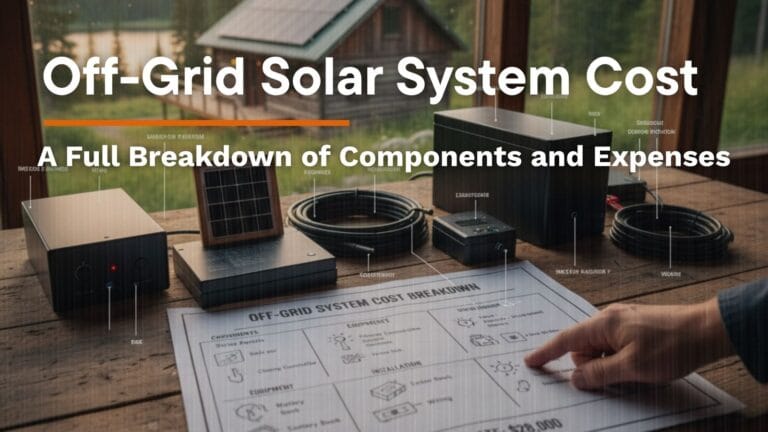Are Solar Panels Really Worth Investing In? Full Analysis
As the global energy landscape rapidly shifts toward sustainability, solar panel systems have emerged as not just a cleaner alternative to fossil fuels, but a powerful financial asset. However, a lingering question remains for many homeowners and businesses: Is solar energy truly a financially sound investment? This is a valid concern, given the significant upfront costs.
This in-depth analysis is designed to address that very question. Drawing on reliable industry data and expert evaluations from leading organizations, we will explore the real-world costs, the substantial long-term savings, potential risks, and the overall value of solar panels. My goal is to provide a clear, fact-based financial assessment to help you cut through the marketing jargon and make a truly informed decision for your home or business.
What Is the Downside of Solar Panels?
While solar panels offer numerous environmental and financial benefits, it’s only responsible to have a frank look at the downsides. Understanding these limitations is not a reason to dismiss solar; rather, it’s essential for making a truly informed decision.
Here are the key disadvantages and how the industry is addressing them:
Maintenance & Degradation: While solar panels are generally low-maintenance, they aren’t a “set it and forget it” product. They degrade slowly over time, losing efficiency at a rate of roughly 0.5% to 1% per year. Occasional cleaning and professional inspections are necessary to ensure the system is performing optimally for its full 25-30 year lifespan.
High Upfront Costs: This is the biggest hurdle for most people. According to the National Renewable Energy Laboratory (NREL), the average residential system in the U.S. costs between $15,000 and $25,000 before incentives. However, federal tax credits, state rebates, and low-interest solar loans have made this cost significantly more manageable, often cutting the price by 30% or more.
Weather Dependence: Solar output is directly tied to sunlight. This means power production drops on cloudy days and ceases entirely at night. This isn’t a deal-breaker, but it does mean you’ll likely need to either rely on the grid or invest in a battery storage system to ensure a consistent power supply.
Space Requirements: A typical 6kW system requires a considerable amount of unshaded roof space—around 400–500 square feet. This can be a challenge for smaller homes or roofs with complex shapes or obstructions.
Efficiency Limitations: The average solar panel efficiency is around 18%–22%, meaning a significant portion of the sunlight hitting the panel isn’t converted into usable electricity. While this may sound low, it’s a vast improvement from just a decade ago, and ongoing research is pushing efficiency higher every year.
Do Solar Panels Really Make a Difference?
Yes. Solar panels offer significant, quantifiable benefits that extend far beyond a single household’s electricity bill. Their impact on a larger scale makes them a vital component in the global shift towards a cleaner, more sustainable future.
Environmental Impact: A Reduction in Carbon Emissions
The most direct and widely recognized benefit is the reduction of carbon emissions and the lessened dependence on non-renewable energy sources. By generating clean electricity from sunlight, solar panels displace power that would have otherwise come from fossil fuels. The U.S. Environmental Protection Agency (EPA) reports that a typical residential solar system can prevent thousands of pounds of carbon dioxide from entering the atmosphere annually, which is a powerful contribution to the fight against climate change.
Economic and Infrastructure Benefits
The value of solar panels goes much deeper than their environmental credentials.
- Grid Independence: Solar panel systems can be paired with battery storage, offering a path to partial or even complete independence from the utility grid. This not only gives homeowners a secure power source during outages but also reduces the overall strain on the national grid.
- Peak Load Reduction: A key benefit for the energy infrastructure is that solar production aligns perfectly with the hours of peak demand (typically hot afternoons when air conditioners are running). By producing power exactly when the grid is most stressed, solar helps relieve that strain, reducing the risk of blackouts and the need for expensive “peaker plants” that burn fossil fuels.
- Job Creation: The solar industry is a powerful economic engine. The Solar Energy Industries Association (SEIA) has reported a booming job market, with hundreds of thousands of jobs in the U.S. alone attributed to solar energy. This job growth extends across manufacturing, installation, sales, and maintenance, providing sustainable employment opportunities.
Ultimately, solar panels make a quantifiable and multi-faceted difference—not only to the individual user but also to the broader energy infrastructure, the economy, and the global environment.
How Much Money Will I Save If I Install Solar Panels?
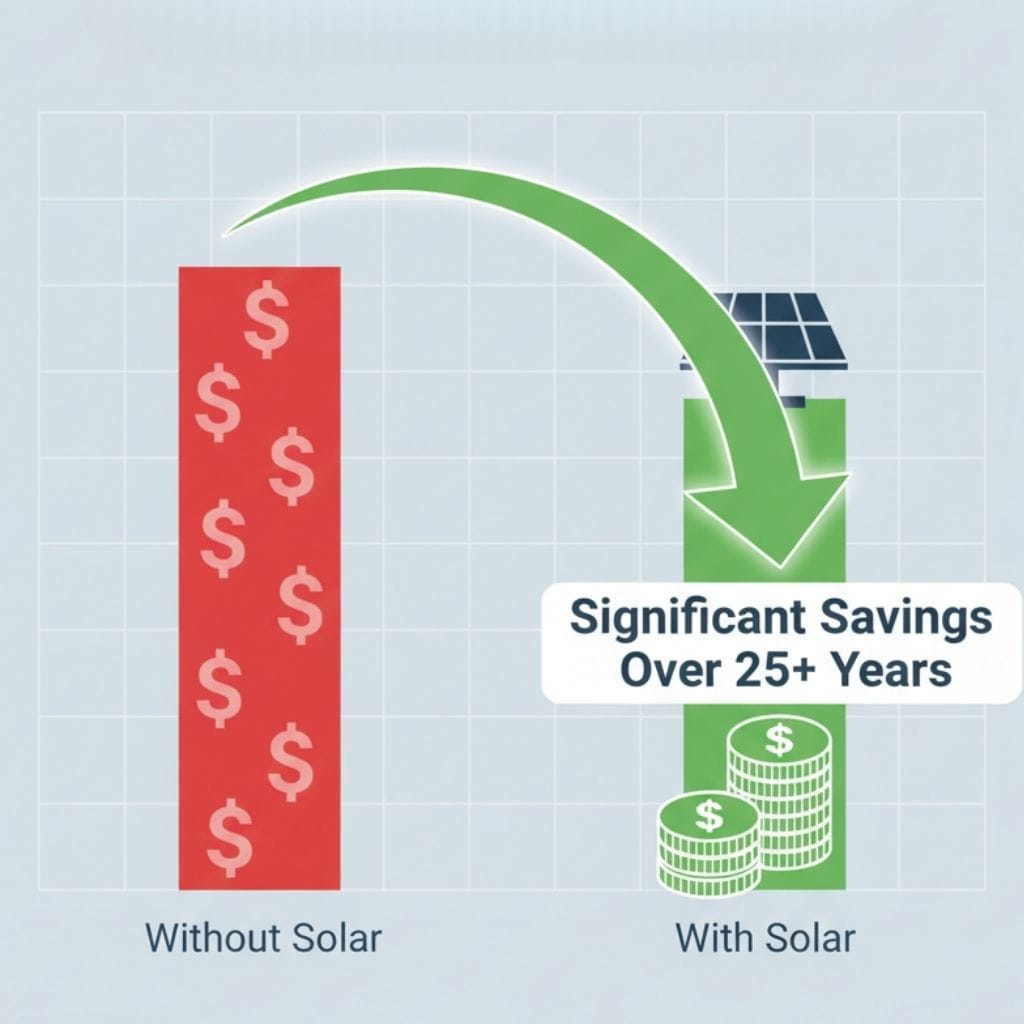
Saving money with solar panels isn’t a “one-size-fits-all” scenario. Your exact savings depend on a combination of factors, but national averages provide a useful starting point for a financial assessment.
How Much Can You Actually Save?
- Monthly Savings: On average, a typical homeowner in the U.S. can expect to save between $100–$250 per month on their electricity bill. This range depends heavily on your location’s sunlight and electricity rates. For instance, a home in a sunny state with high utility costs will see a much higher monthly saving than one in a cloudier region with lower rates.
- 25-Year Lifetime Savings: Over the long lifespan of a solar system, the cumulative savings become truly significant. Based on current trends and factoring in rising energy costs, the total savings over 25 years can range from $20,000 to over $60,000. This makes solar an excellent long-term investment that protects you from future increases in utility prices.
Key Financial Boosters
Two powerful financial mechanisms further enhance your savings:
Net Metering: Many states and utility companies offer net metering programs. This allows you to sell any excess electricity your panels produce back to the grid. Your utility company then credits your account for this power, which can significantly reduce or even eliminate your monthly bill.
Federal Solar Tax Credit (ITC): This is one of the most impactful incentives available. The federal solar Investment Tax Credit (ITC) allows you to deduct a significant portion of your installation costs directly from your federal taxes. This incentive can single-handedly shorten your payback period by several years.
What Is the Biggest Risk of Solar Panels?
While solar energy offers tremendous benefits, it’s essential to approach the investment with a clear understanding of the risks. This isn’t about scaring you away from solar, but about empowering you to make a smart, informed decision by anticipating potential issues. Here are the most significant risks and how to manage them like a pro.
Financial Risk
The core financial risk is straightforward: if your local utility electricity rates are low or if you need to sell your home before the system’s payback period is complete, you may not see the financial returns you expected. Unexpected changes in solar policy, especially with net metering or energy buy-back rates, can also directly impact your expected savings. The key to mitigating this is to work with an expert who can provide a realistic financial forecast based on your regional market and to stay informed about long-term policy trends in your area.
Installation Quality
This is arguably the most critical risk. A solar system is only as good as its installation. Poorly installed systems can lead to a host of problems, including roof damage, water leaks, or faulty wiring that compromises efficiency and safety. The number one rule is to always hire certified professionals. Industry experts universally recommend working with NABCEP-certified installers. This certification proves they have the knowledge and experience to install your system correctly, securely, and in compliance with all safety and building codes, protecting both your investment and your home.
By being aware of these risks and taking proactive steps to manage them, you can confidently move forward with a solar project that delivers on its promises.
What Is More Efficient Than Solar Panels?
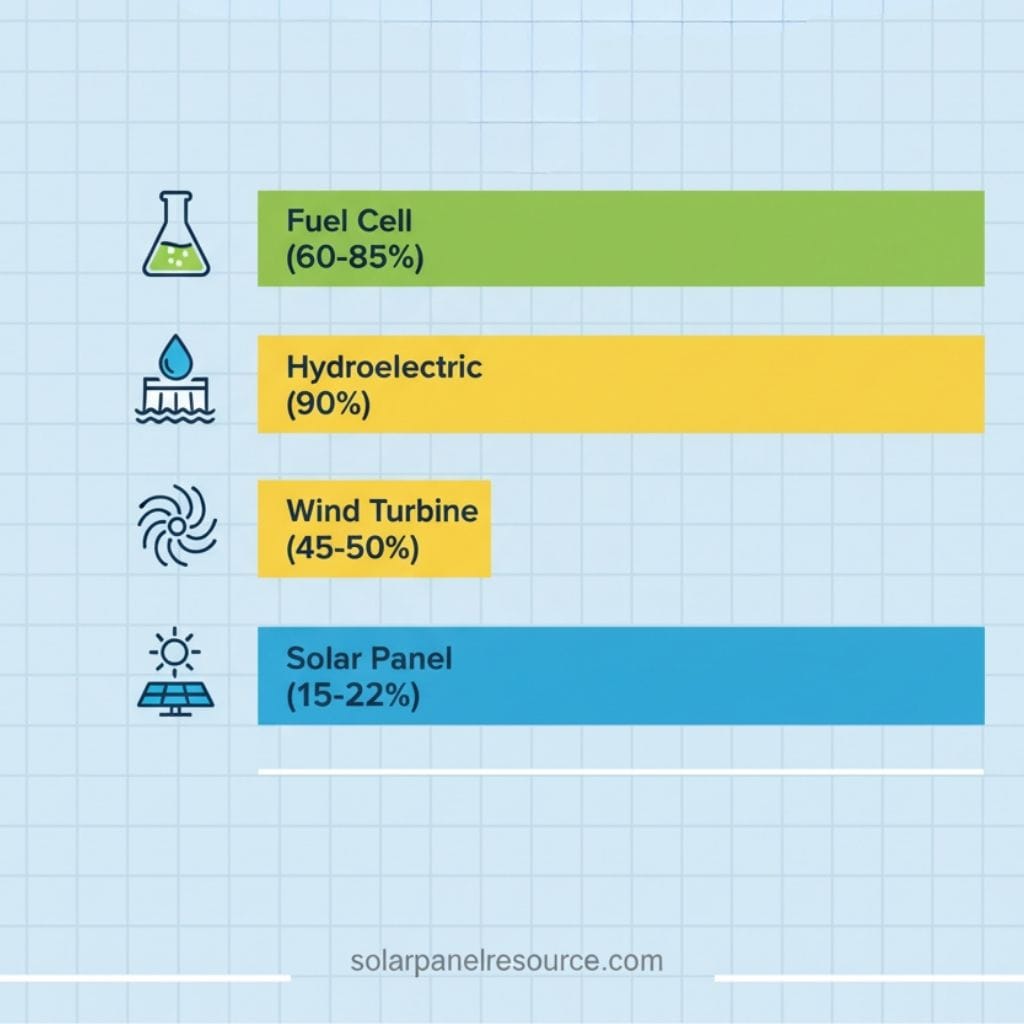
While solar panels are currently the most accessible form of renewable electricity for residential users, it’s important to understand the full energy landscape. Solar is not the only option, and other technologies can offer superior efficiency or output under specific, and often large-scale, circumstances. This is a topic that requires a professional and balanced perspective.
Concentrated Solar Power (CSP)
- The Technology: Unlike photovoltaic (PV) solar panels that convert sunlight directly into electricity, Concentrated Solar Power (CSP) uses vast arrays of mirrors to focus sunlight onto a central receiver. This superheats a fluid, which in turn creates steam to spin a turbine and generate electricity—a process similar to a traditional power plant.
- Why It Can Be More Efficient: This thermal process can achieve overall efficiencies of over 40%, often surpassing what the average PV panel can do on its own.
- The Catch: CSP is only practical at a massive, utility-scale level in specific locations with very high and direct sunlight. Its complexity and size make it an impractical choice for a residential rooftop.
Wind Energy
- The Technology: Wind turbines capture the kinetic energy of wind to generate electricity.
- Why It Can Be More Efficient: In high-wind regions, a small-scale wind turbine can produce significantly more annual output per installed kilowatt than a solar panel system. Wind can also produce power 24/7 as long as the wind is blowing.
- The Catch: Residential wind turbines are far less common than solar panels. They require open, unobstructed land and are often more expensive and louder than a solar installation, making them a less practical option for most urban or suburban homeowners.
Hydropower
- The Technology: Hydropower uses the natural flow of water to turn a turbine.
- Why It Can Be More Efficient: For homes located near a running stream or river, a micro-hydro system can provide a highly consistent and reliable power source with a high capacity factor, often outperforming solar panels in terms of continuous output.
- The Catch: This is the least scalable and most location-dependent option. Only a tiny fraction of homeowners have a suitable, year-round water source on their property.
Ultimately, while these technologies excel in specific niches, solar panels remain the most practical and accessible option for most residential users. Their scalability, consistent decline in costs, and ability to be installed on rooftops without major site modifications make them the clear leader for home-based renewable energy.
How Many Solar Panels to Power a House?
Figuring out the number of solar panels you need is a core part of the planning process, and it’s a calculation that’s both an art and a science. While a simple average can give you a starting point, a truly accurate estimate requires a more detailed, professional approach.
The Standard Breakdown
The number of panels required for your home depends on three primary factors: your energy consumption, the wattage of the panels, and your geographic location.
- Energy Consumption: The first step is to check your electricity bills to find your annual energy usage, measured in kilowatt-hours (kWh). The average U.S. household consumes around 10,600 kWh per year, but this can vary widely. Knowing your personal number is key to a precise design.
- Panel Output: The rated power of a solar panel, measured in watts, has been increasing steadily. While 400W was once the standard, modern residential panels are now commonly rated between 400W and 450W. A higher wattage means you’ll need fewer panels to reach your target system size.
- Geographic Location: This is where things get a bit more technical. The amount of electricity a panel produces isn’t just about its wattage; it’s about how much effective sunlight it receives over the course of a year. This is known as solar irradiance.
Calculating Your Needs
Let’s use a standard example. To offset an average annual consumption of 10,600 kWh, you’ll need a system in the range of 6 to 8 kilowatts (kW). Using modern 400W panels, this would require a system of approximately 15 to 20 panels.
This is where a professional analysis comes in. Tools like the NREL PVWatts Calculator are essential because they use decades of weather data to estimate production based on your specific location, roof angle, and potential shading. These variables—like a roof facing south versus one facing east, or the amount of shade from nearby trees—can significantly impact your system’s final size and performance, making a one-size-fits-all approach insufficient. Ultimately, a custom design is the only way to ensure your solar investment meets your specific energy needs.
Are Solar Panels a Good Investment?
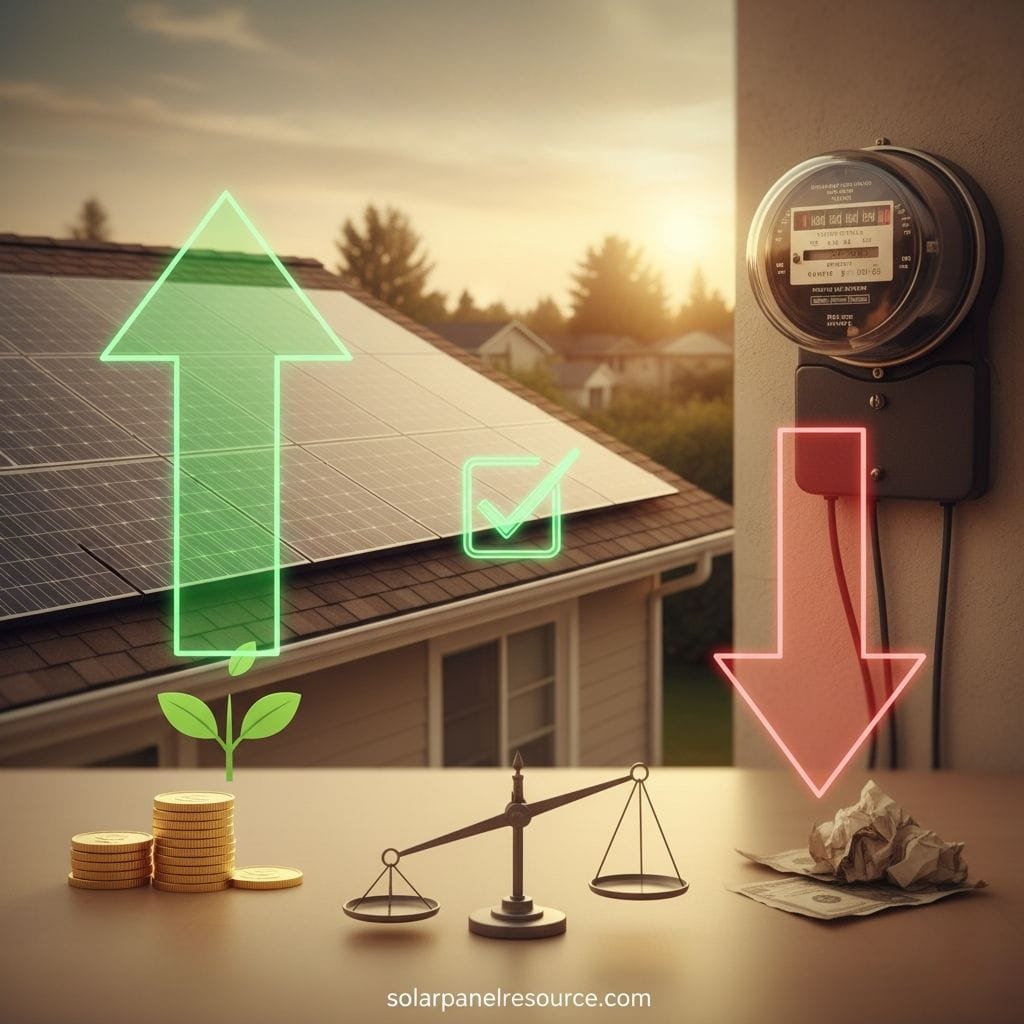
From both an economic and environmental standpoint, solar panels are generally considered a sound investment. The question for many isn’t if solar is a good investment, but how good it is. The data consistently shows that the financial case for solar is getting stronger with each passing year.
Your Financial Payoff
- Payback Period: This is the first milestone for any solar owner. The time it takes to recoup your initial investment has been steadily decreasing. While the range varies by location, most homeowners can expect to reach their break-even point in just 6-10 years. After that, all the electricity your system produces is essentially free.
- Return on Investment (ROI): Your payback period is a matter of when, while your ROI is a measure of how much. Over a system’s typical 25–30 year lifespan, the average ROI for homeowners in the U.S. is a strong 8% to 14%, with some regions seeing even higher returns. This performance often rivals or even surpasses other common home investments.
- Property Value: In addition to long-term savings, solar panels are a tangible asset that can increase your home’s value. Recent research from Zillow and other real estate analysts indicates that homes with owned solar panel systems sell for an average of 4.1% to 6.9% more than comparable non-solar homes. This added value can help you recoup your investment should you decide to sell before the system has paid for itself.
A Stronger Case Than Ever
The financial case for solar is becoming increasingly undeniable. Utility prices continue to rise across the U.S., making every kilowatt-hour of self-generated power more valuable. At the same time, the cost of solar technology continues its long-term decline due to manufacturing advancements and increased global production. These two trends converge to make the decision to go solar a more financially compelling move with each passing year.
Do Solar Panels Work in Winter?
Yes, solar panels absolutely work in the winter, and they’re far more effective than most people realize. While the shorter days and lower sun angle of winter do reduce overall energy production, panels are specifically designed to handle cold and even snow. This is a crucial point to understand, especially if you live in a northern climate.
Cold Weather Actually Boosts Efficiency
This is one of the most surprising facts about solar panels: they operate more efficiently in cold, sunny weather than they do in extreme heat. The photovoltaic cells inside the panels function best at cooler temperatures. As temperatures rise above a certain point, a panel’s voltage drops, leading to a slight decrease in efficiency. This means a clear, cold winter day can actually produce a higher peak output than a sweltering summer day.
Navigating Snow and Sun Angle
Snow accumulation is the biggest concern for winter production. A thick blanket of snow will block sunlight and bring production to a near halt. However, most panels are installed at a steep enough tilt (around 30-45 degrees) for snow to slide off naturally as it melts from the panels’ dark surface. A light dusting can even be beneficial, as it can reflect additional sunlight onto the panels, a phenomenon known as the albedo effect.
While the sun is lower in the sky during winter, professional installers factor this into the system design, often orienting panels for optimal year-round production. Data from the Solar Energy Technologies Office confirms that well-maintained systems in northern climates still produce a substantial portion of their annual yield during the winter months, with a significant amount of that production being banked during the sunnier months through net metering to offset winter usage. Ultimately, the performance is a matter of light, not heat, which makes solar a viable option in many cold regions.
Is It Safe to Live Next to Solar Panels?
Living near or under a solar panel system is considered very safe by scientific and regulatory bodies around the world. The primary concerns people have—fire, electromagnetic fields (EMFs), and structural integrity—are all addressed by strict industry standards and professional installation practices.
Fire Risk
While solar-related fires are a concern, they are extremely rare, and when they do occur, they are almost always the result of faulty wiring or poor installation, not the panels themselves. The panels are made of glass and aluminum and are designed to be fire-resistant. The real risk comes from the electrical connections and inverters. To mitigate this risk, it’s crucial to hire a NABCEP-certified installer who uses UL-listed components (certified by Underwriters Laboratories). These components are rigorously tested to ensure they meet the highest safety and fire resistance standards, giving you peace of mind.
Electromagnetic Fields (EMFs)
This is a common concern for people living directly under panels, but the reality is that the EMFs emitted by a solar system are far below international safety thresholds and are comparable to common household appliances. For context, the inverter, which is the main source of EMFs, typically generates levels much lower than a microwave oven or a hairdryer. These fields also dissipate quickly with distance, so living on a different floor or placing the inverter in a garage or basement effectively minimizes any potential exposure.
Structural Integrity and Longevity
Solar panels are not just electrical components; they are a permanent part of your home’s structure. For this reason, they are subjected to rigorous testing for wind, hail, and fire resistance. Key standards like UL 1703 and IEC 61215 ensure that the panels can withstand extreme weather without compromising your roof’s integrity. A certified installer will also perform a structural analysis of your roof to ensure it can handle the load, which is a required step for a safe installation.
In conclusion, while it’s smart to be aware of the potential risks, the scientific consensus is clear: a properly planned and professionally installed solar system poses no significant health or structural risks to residents. The decision to go solar should ultimately be based on your energy needs and financial goals, with the knowledge that the safety risks are minimal and well-managed by today’s technology and industry practices.
You can make the right choice for you by reviewing our blog post titled Top 10 Best Solar Panels in 2025 (Features, Pros & Cons).

Solar Energy Enthusiast & Renewable Energy Researcher
Vural’s journey into solar energy began four years ago, driven by frequent power outages and high electricity bills at his own home. He has since gained hands-on experience with both personal and commercial solar projects. At solarpanelresource.com, Vural shares his real-world insights and in-depth research to guide homeowners and business owners on their own path to energy independence.
